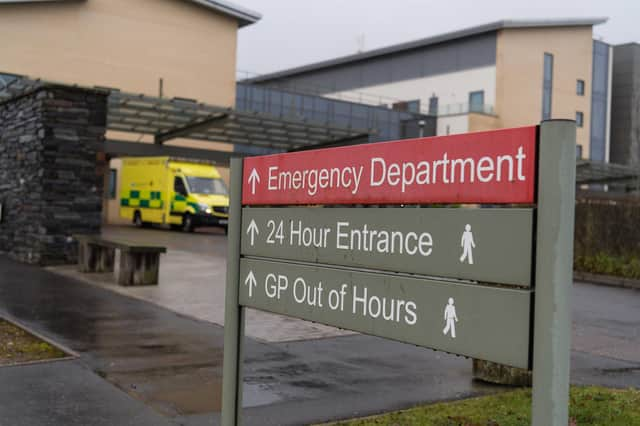Ben Lowry: Stormont is said to be essential, yet it seems unable to handle health


The assembly was struggling to operate given the bitter political divisions over how to handle welfare reform. Many MLAs were reluctant to take hard decisions.
Lord (David) Trimble was first to suggest that welfare power return to Westminster, from where he said it should never have been removed.
Advertisement
Hide AdAdvertisement
Hide AdJim Allister also said it should return to London, as did Peter Robinson. The former DUP leader said that such a transition was logical if the lower parliament was not deemed competent to deal with the matter.
Something similar has been happening with health. Stormont has not had the political will to tackle problems in NHS provision that have been building for 20 years.
Assembly members will not reform hospital care in the way that multiple health experts have urged them to do for two decades.
This helps explain why there was a sudden withdrawal of surgery from the South West Acute Hospital (SWAH) at Enniskillen this week.
Advertisement
Hide AdAdvertisement
Hide AdIt was back in 2000, when the post Belfast Agreement Stormont was still in its infancy, that the hugely respected former civil servant Maurice Hayes was commissioned to examine hospital provision in the province.
His report, and multiple reports thereafter, found that Northern Ireland needed a smaller number of hospitals that deal with acute illness.
A decade later a report called Transforming Your Care found the same thing, as did another, Bengoa, in 2016.
All MLAs who think about how society is run know this, yet they will not act.
Advertisement
Hide AdAdvertisement
Hide AdWhy? Because they will be seen to be closing hospitals. If a politician from one party does what needs to be done, a politician from another will denounce them for Dickensian style cruelty.
The stalemate means that Northern Ireland has hospitals with worse patient outcomes than they should. Precious NHS cash is wasted on inefficient provision of key services.
Meanwhile, the NHS moves deeper into crisis.
Michelle O’Neill, who is quick to point out that she should be first minister, was health minister at the time of Bengoa. Martin McGuinness gave her cover to do the right thing in the year before he died by appearing alongside her to endorse reform. This was significant because the former Sinn Fein deputy first minister had often been quick to denounce Tory austerity, and even he accepted that hospitals needed urgent streamlining.
Yet there has been a cross-party failure to explain to the public that reform of health will, yes, lead to a smaller number of hospitals in Northern Ireland but they will be world class units with lower death rates.
Advertisement
Hide AdAdvertisement
Hide AdHospitals work best when they are centres of excellence in which a critical mass of medical and nursing experts congregate.
In 2011 I talked to a health economist who had worked on both sides of the Atlantic and who said that many campaigns to save a local hospital should in fact be named ‘Save our Failing Hospital’.
Yet far from explaining such things to voters, most politicians instead pander to ill informed public opinion and join public protests against any change.
Remember the ‘Save the Mid’ campaign?
And did you notice a report we published in 2019 on Downe Hospital? Newly released government papers then revealed that ministers knew in the 1990s that a £70 million new hospital in Downpatrick was not viable, yet built it because the local population would not accept the removal of services from the area.
Advertisement
Hide AdAdvertisement
Hide AdWhat has happened at Downe is happening elsewhere: services have gradually been relocated to better centres.
Healthcare in Northern Ireland is being reformed by crisis, as happened at Enniskillen this week when emergency general surgery was withdrawn from SWAH.
Dr Brendan Lavery, director of the Western Trust, seemed to tell protestors what they wanted to hear, that it was a temporary measure, but a surgeon Barry McAree told them what they needed to hear.
He hoped it would be permanent and said it “should have happened a long time ago”.
Advertisement
Hide AdAdvertisement
Hide AdMr McAree also said that if the Bengoa review been "properly implemented" change would have happened in a more controlled way.
"The fact is that surgeons and patients are better looked after in bigger units with longer travel times even taken into the mix.”
I would go further and say that reform will help release funds for top-class roads between these world-class hospitals. That would reduce the time taken for ambulances to rush people to units where they would get outstanding NHS care. Such infrastructure would be of general benefit to the community (roads which have two lanes in each direction and barriers in the middle have far fewer accidents).
A top NI GP, Dr Alan Stout, who is today giving a speech on the pressure on family doctors, will say: “It is a complete disgrace, with us left feeling like we are carrying all of the responsibility and the accountability for a failing system … We cannot continue to be blamed for issues in the wider health system that always end up back at our door.”
Advertisement
Hide AdAdvertisement
Hide AdStormont’s failure to implement health reform is at the heart of NHS problems, including waiting lists.
Rishi Sunak and others imply that the return of the assembly will be a panacea for many of NI’s problems, but the political cowardice around health challenges that idea.